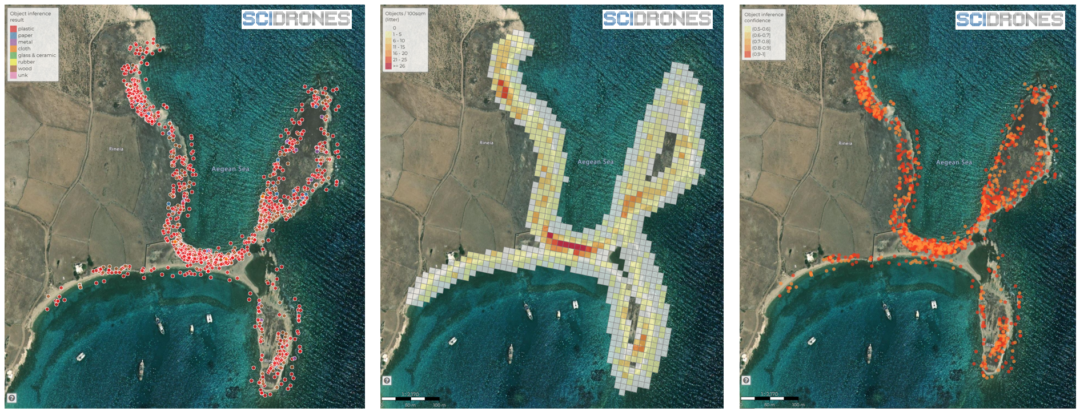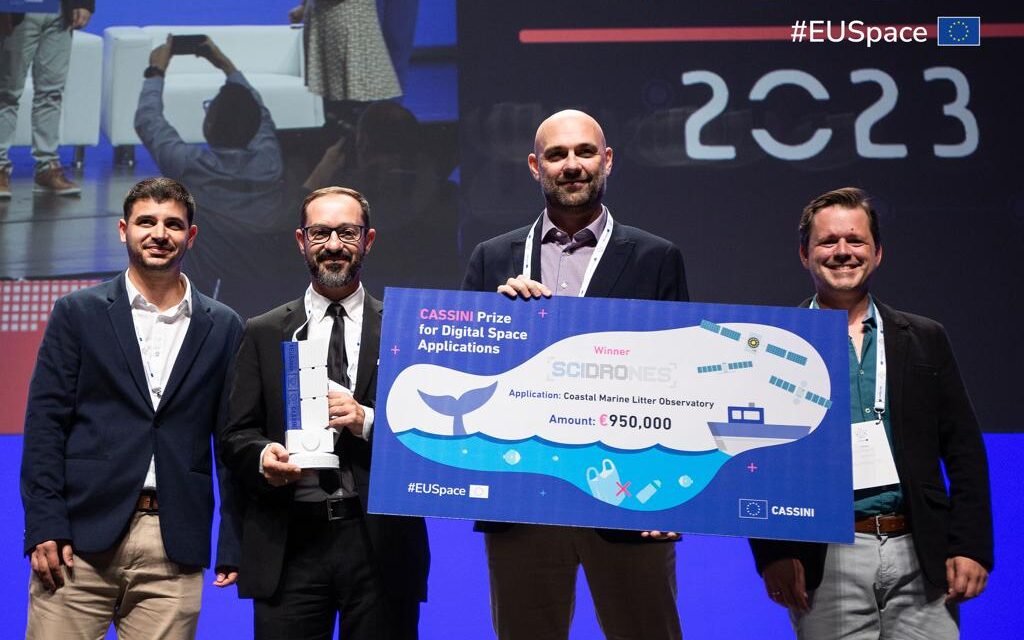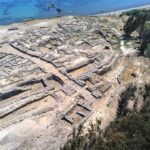SciDrones, a pioneering University of the Aegean spin-off, was awarded the CASSINI Maritime Prize during the European Space Week 2023 held in Seville this November. This prestigious prize is a European Commission initiative to support businesses and startups that develop innovative solutions to tackle the issue of marine plastic pollution.
The prize is awarded to one or several data-driven marine digital applications that use data from EU’s satellite systems Galileo and/or Copernicus to solve problems related to the detection, monitoring, tracking and removing plastic pollution in rivers, lakes, shores and coastal zones, in order to prevent ocean pollution. The total prize is 2.85 million euros, and the top three proposals win 0.95 million euros each; this prize expected to leverage more private investment capital to the winning contestants. The award is launched by EUSPA (EU Agency for the Space Programme) and aims at creating a new ecosystem of companies; all proposed solutions have to be close-to-market and to be able to prove their effectiveness in demonstration in a realistic environment.
SciDrones (s.s Scientific Drones), created by members of the Marine Remote Sensing Group (MRSG) of the University of the Aegean Marine Sciences Department, is among the three winners of the 2023 CASSINI prize. Using an innovative combination of Copernicus data with high-resolution UAS (Unmanned Aircraft Systems, i.e. drones) images and advanced AI algorythms, SciDrones developed the CMLO (Coastal Marine Litter Observatory) application with the aim of improving the detection and mapping of marine litter in the coastal zone.
The application automatically detects litter on the coasts, categorizes it into 7 different categories (plastic, paper, metal, cloth, glass & ceramic, rubber, and wood), differentiates it from other sources of natural debris, such as twigs and algae, and creates maps with areas that contain a high density of waste. Local authorities can use the app to guide their clean-up operations, allocating resources to those beaches and environments that are particularly burdened with litter and especially plastics.
Up till now, the mapping protocol of the marine litter in the coastal environment is carried out by using conventional on-site sampling. Existing data collection systems have limited ability to spatially display the concentrations of marine waste in the coastal zone. On the contrary, the use of UAS allows CMLO wide area coverage, providing the actual litter evidence (through high-resolution aerial images). Aerial imagery, in combination with machine learning methods, composes an automated procedure of locating and mapping marine litter in the coastal area. In the CMLO app, users can interact and compare the marine litter detection results for every beach monitored.
CMLO and the produced marine litter density maps can be used as a decision-making tool for policymakers and scientists. The integration and visualization of the litter density information facilitate decision-making by stakeholders and, last but not least, the litter density maps and their spatiotemporal analysis are provided open to the public and organizations (NGOs, Local authorities, Governments, researchers, etc.).

Associate Professor Konstantinos Topouzelis at the Department of Marine Life Sciences of the University of the Aegean is the head co-founder and SciDrones; as he explains, the company’s aims in participating to the competition were to stimulate the development of innovative solutions, to help solve problems related to the detection, monitoring and removal of plastic waste in rivers, coasts and coastal zones, and finally, to mobilize private investment and to close-to-market solutions. The close-to-market term refers to projects that launch innovative, demonstrative solutions that offer clear environmental and/or climate benefits and that have a high level of technical and business readiness.
As professor Topouzelis stresses, “this distinction attests to the internationally recognized, leading scientific and research output of the University of the Aegean, which, together with our high quality teaching and extensive contribution to society, elevates our University to one of the best in the world.”
Sci-Drones
As is mentioned on the site of Sci-Drones, the ocean receives solid waste from human activities, distributing the load widely, but not evenly. Floating marine plastics is a threatening problem for the world’s oceans. Marine plastic debris is tied to plastic production, which has grown exponentially over the last 70 years, from 1.7 million tons in 1950 to 322 million tons in 2015 (European Commission 2020). Remote sensing is one of the tools necessary for the detection of floating marine plastics because of the extensive area coverage and frequent observation. Sci-Drones’ solution is the detection and monitoring of marine litter presence on coastal zones by creating marine litter density maps from aerial images using Unmanned Aerial Systems (UAS) and sophisticated Artificial Intelligence (AI) algorithms.
SciDrones P.S. is a startup company located in Lesvos Island, Greece that has been founded in 2021, by a team of experts in coastal mapping. Its founders have experience in remote sensing, geoinformatics, and Unmanned Aerial System (UAS) technologiesm, and the start-up was a natural result of 7 years of intensive academic research on UAS technology and visualization of the geoinformation in the coastal area.
SciDrones’s main focus is the mapping and quantification of emerging coastal phenomena through state-of-the-art sensors; quantification includes artificial intelligence algorithms and dedicated spatiotemporal visualizations and analytical tools transform remote sensing data into real Information that drives decision-making. Besides being among the winners of the the CASSINI Prize for Digital Space Applications this year, the company has been awarded a grant from EIT Digital Venture Program 2021 and has won the first prize at the Aegean Startups 2021-22 Awards. In addition, SciDrones is an alumnus of ACEin startup incubator in Athens, Greece.
Research at the Department of Marine Sciences at Aegean University
Situated at the eastern part of the Aegean archipelago, the Department of Marine Sciences (DMS) offers Bachelor, Master and Ph.D. degrees in Oceanography, while conducting international level research in various areas related to the marine environment, such as climate change, ecosystem functioning and health, marine biodiversity and conservation, fisheries, aquaculture and marine resources in general, as well as coastal zone problems such as coastal erosion and pollution. The Department of Marine Sciences (DMS) aims to be at the forefront of marine research through observation, theory, modelling and technological innovation, as well as international collaborations with leading marine research institutes.

DMS also conducts research in a broad range of subjects related to the marine environment, Physical Oceanography and Marine Biogeochemistry, to Marine Resource Management and the study of environmental and socio-economic impacts of human-nature interactions in the coastal zone. Research over this broad range of subjects, conducted by six Research Laboratories: Environmental Quality and Geospatial Applications; Marine Biodiveristy and Ecosystems Management; Ichthyology, Aquaculture and Fish Diseases, Ecology and Systems’ Dynamics; Physical & Chemical Oceanography and Coastal Morphodynamics – Management & Marine Geology.
Part of Department of Marine Sciences is the Marine Remote Sensing Group (MRSG), whose member launched the Sci-Drones spin-off. MARSC, also headed by professor Topouzelis has been conducting research for the exploration, analysis and visualization of the satellite and UAV data in the coastal environment since September 2014. The group has gained expertise in several disciplines of marine remote sensing including oil spill detection, oceanic phenomena identification, seagrass mapping, coastal bathymetry and coastline detection and boasts a large number of ongoing and completed research projects.
I.L., all images from Sci-Drones and Department of Marine Studies websites.
Read also from Greek News Agenda
- Greek Research Institute FORTH’s spinoffs & technologies go global
- New Genomics Institute in Athens: a leap for research in Greece
- Strategic Initiatives supporting the Greek startup ecosystem
TAGS: BUSINESS & TRADE | EDUCATION | INNOVATION | RESEARCH | SPIN-OFFS














